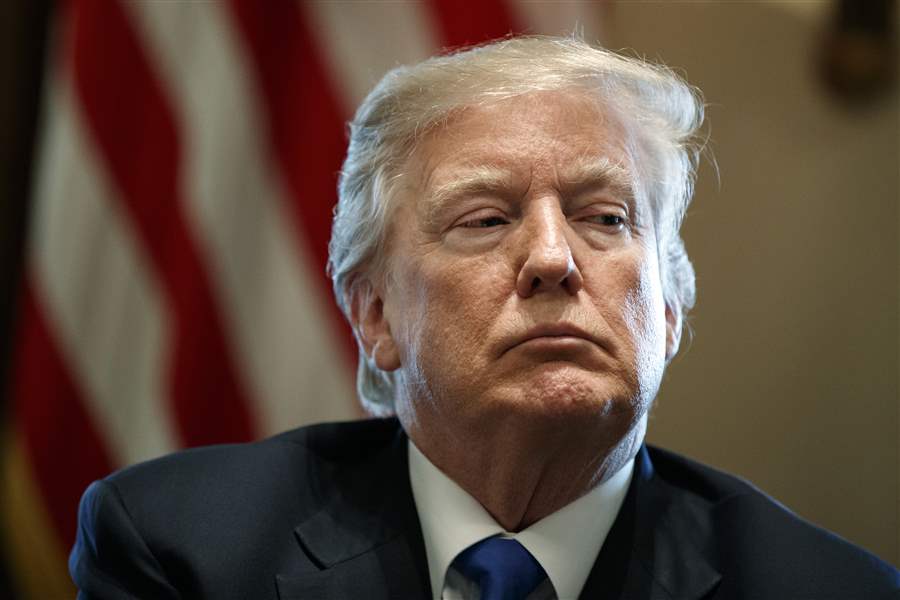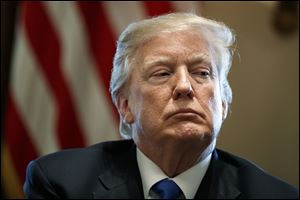
FREE SPEECH FOR THEE?
President Trump is undermining the national character
1/12/2018
President Donald Trump's uninformed and seemingly unprincipled petulance about so many matters of public policy is disturbing.
ASSOCIATED PRESS
Here we are, again.
President Donald Trump, incensed by the publication of Michael Wolff’s provocative new book Fire and Fury: Inside the Trump White House, has lashed out once again against free expression.
After attempting unsuccessfully to block publication of Fire and Fury, a move which actually hastened the book’s release, Mr. Trump accused Mr. Wolff of fabricating the book’s content and suggested, not for the first time, that libel laws should be made stronger.
In what appears to be Mr. Trump’s view — his expressed views are not explicit — precedents holding that statements proven true cannot be held to be libelous would be set aside in favor of new statues favoring the aggrieved.
“The libel laws are very weak in this country,” Mr. Trump said at Camp David on Saturday. “If they were strong, it would be very helpful. You wouldn’t have things like that happen, where you can say whatever comes to your head.”
Given Mr. Trump’s accusatory style of politics and his propensity for name calling, his call for stronger libel laws may strike observers as odd and ironic.
What is more important, however, Mr. Trump’s comments reveal what appears to be an inability — or a refusal — to distinguish between libel and criticism. The consequences of a president’s failure to make this distinction should never be discounted.
The basis of U.S. libel law can be traced back to the Zenger case of 1735, in which a colonial court found that a statement, even if it is defamatory, cannot be libelous if it can be proven.
Modern libel case law has largely been informed by the 1964 case New York Times Co. vs. Sullivan, in which the Supreme Court ruled unanimously that press reports critical of a public official can only be libelous if they meet the “actual malice” standard.
What is “actual malice”? According to the late Justice William Brennan, “actual malice” exists when a statement is made “with knowledge that it was false or with reckless disregard of whether it was false or not.”
But, as the attorneys for Henry Holt & Co., the publisher of Fire and Fury, have noted, Mr. Trump has yet to identify “a single statement in the book that is factually false or defamatory.”
Is Mr. Trump’s bluster about Fire and Fury likely to be significant? The answer is “no” and “yes.”
Fire and Fury is not a good book. It is riddled with inaccuracies, and that it makes an obvious effort to exploit the appetite for the sensational at the expense of sound reporting raises serious questions about its credibility. It is unlikely to be of lasting importance. Mr. Trump’s continuing attacks on freedom of the press are another matter, however.
For years, Mr. Trump has attacked the media regularly, complaining about unscrupulous journalists and libelous publishers, often without any basis in fact.
It is important to note, however, that Mr. Trump’s predecessors have also attacked the press with regularity.
President Barack Obama had his administration spy on reporters and aggressively pursue leakers and whistleblowers. Mr. Obama also requested that Yemen keep a journalist in prison after that journalist helped expose possible U.S. war crimes.
During the Clinton administration, in the course of what proved to be numerous political scandals, relations between President Clinton and the press became increasingly hostile, reaching a point at which the legitimacy of the press was questioned frequently by the White House. President George W. Bush’s administration was characterized by a similarly contentious relationship with the media, especially where questions about national security and the conduct of the wars in Afghanistan and Iraq were concerned.
The difference between the actions of Presidents Obama, Clinton, and Bush and those of Mr. Trump? It is, in the main, a matter of subtlety, compounded by what often appears to be a remarkable ignorance of both civics and history. Then there are the effects that Mr. Trump’s attacks have on public perceptions of various issues, not the least of them being the basic character of our system of government and laws.

President Donald Trump's uninformed and seemingly unprincipled petulance about so many matters of public policy is disturbing.
Surveys indicate that Americans have a limited understanding of the First Amendment, that our collective appreciation of the importance of free expression is insufficient and in decline.
While the actions of previous presidents have contributed to this problem, Mr. Trump’s over-the-top assaults on free expression make matters even worse, deepening already substantial public confusion about the importance of freedom of speech and freedom of the press.
Read last week’s ‘Free Speech For Thee?’ column
The attendant hand wringing is wholly appropriate. Free expression is a vital aspect of the nation’s history and character. Since colonial times, Americans have acted in the belief that if we guarantee the right to express ourselves freely, the truth will emerge far more often than not, and that such truths are, as noted by Thomas Jefferson, the path to real wisdom.
I believe fervently in the importance for free speech and its essential byproduct, truth telling. And I worry deeply when I am confronted by a President who makes statements, whether in the interests of political expediency, personal vanity, or national security, that call free expression into question.
Mr. Trump’s open hostility to a free press is dangerous. His frequently uninformed and seemingly unprincipled petulance about matters of public policy is disturbing, but his attacks on the most fundamental tenets of American government, launched from the seat of government itself, are of a different and far more disturbing order, and they should raise resounding alarm in Washington D.C., and across the country.
That alarm has been sounded in many places and by many people over the last year, but Mr. Trump continues to have the support of the Republican Party and a substantial portion of the electorate.
That he continues to command this support is a reminder of another aspect of the American character founded in a native cynicism about the nature of truth that was articulated presciently by Mark Twain in 1880, long before The Apprentice was aired.
“I don’t mind what the opposition say of me so long as they don’t tell the truth about me,” Mr. Twain said. “But when they descend to telling the truth about me I consider that this is taking an unfair advantage.”
Contact Will Tomer at wtomer@theblade.com, 419-724-6404, or on Twitter @WillTomer.